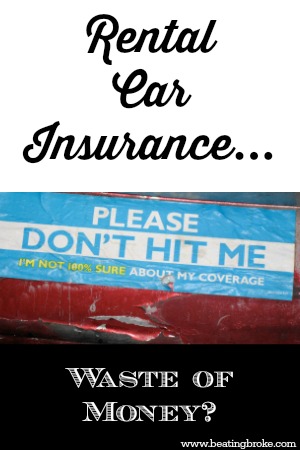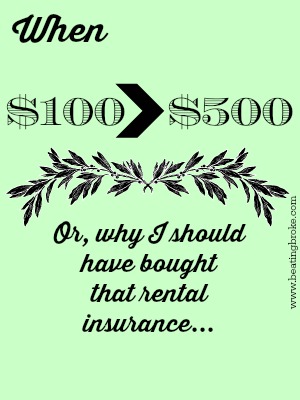Our house came with a homeowners’ warranty. The realtor we worked with, noting that our air conditioning unit was 18 years old, told us to make sure to keep up with the warranty because that would cover the cost of replacement on our central air unit.
At $650 a year, keeping up with the homeowners’ warranty to replace a $4,000 to $6,000 central air unit that was on its last legs sounded like a good deal.
Homeowners’ Warranties—Buyers Beware
Last year, one week into home ownership, our hot water heater died, and we got a glimpse of how the homeowners’ warranty worked.
 I was not impressed.
I was not impressed.
We had to work with a specific company, I’ll call Company A, designated by the homeowners’ warranty, to replace the hot water heater. Company A asked me to call my home owner’s insurance to see if they would pay to have a different company, Company B, come clean up the water damage. (We had very little water damage, but Company A’s repair man assured me we’d get mold, even though we’re in Arizona with very little humidity.) Luckily, I didn’t do that because Company B wanted to charge us $1,000 to clean up the water.
Clearly, Companies A and B must have had kickbacks with one another for business referrals.
Also, I thought we’d only have to pay the $75 service fee to get our hot water heater replaced, and then the homeowners’ warranty would pay the rest.
Wrong.
We still had to pay $375 more for parts and repairs that weren’t covered under the homeowners’ warranty.
The homeowners’ warranty paid $650, so that year, despite the annoyance and out-of-pocket expenses for the hot water heater replacement, the policy paid for itself.
Homeowners’ Warranty Will Only Help If the Appliance Dies
This year, after much thought, especially considering the bad experience with the hot water heater, we decided to renew the policy. We paid another $650.
And then, our air conditioner started the march to a slow death.
First, it worked over time, running all the time, but it couldn’t seem to cool the house.
When our next electric bill came, it was $120 higher than usual.
But, the homeowners’ warranty wouldn’t pay anything for the air conditioner unless it was not working at all.
We called our own repair person and paid $200 to have two pounds of Freon replaced. Two months later, and the cycle is repeating itself. The air conditioner is working constantly, but the house is not cooling. I’m guessing we are already out of Freon.
Now, we’re faced with a choice. Wait for the unit to die so the homeowners’ warranty will cover the cost of the replacement, or replace it ourselves.
If we wait for the unit to die, the homeowners’ warranty may cover the majority of the cost, but we would have no say in the company doing the work or the replacement unit. Meanwhile, we will keep paying to replace Freon and having higher than usual electric bills until the unit dies.
Or, we could replace it ourselves and stop the flow of wasted cash and energy caused by the old air conditioner. We could choose the company we want to work with and what model we’d like as a replacement, the more energy efficient, the better.
While a homeowners’ warranty can save people money, in the long run, for us, it seems to be too much of a hassle and too restrictive to keep up with.
Do you have a homeowners’ warranty? If so, do you find it valuable?
Melissa is a writer and virtual assistant. She earned her Master’s from Southern Illinois University, and her Bachelor’s in English from the University of Michigan. When she’s not working, you can find her homeschooling her kids, reading a good book, or cooking. She resides in New York, where she loves the natural beauty of the area.

 The rental car company we used said any damage smaller than the size of a quarter, they would let slide. Anything bigger than that, and it needed to be repaired.
The rental car company we used said any damage smaller than the size of a quarter, they would let slide. Anything bigger than that, and it needed to be repaired. I was proud of my penny pinching ways until our first night on the road. We were driving along a desolate stretch in Oklahoma; it was dark, and we were ready to stop for the night. A semi was in front of us and swerved at the last minute. We had no time to wonder why; a deer carcass was straight in our path. Even though my husband swerved, he still hit it. We felt the thump under our car and feared the worst.
I was proud of my penny pinching ways until our first night on the road. We were driving along a desolate stretch in Oklahoma; it was dark, and we were ready to stop for the night. A semi was in front of us and swerved at the last minute. We had no time to wonder why; a deer carcass was straight in our path. Even though my husband swerved, he still hit it. We felt the thump under our car and feared the worst.